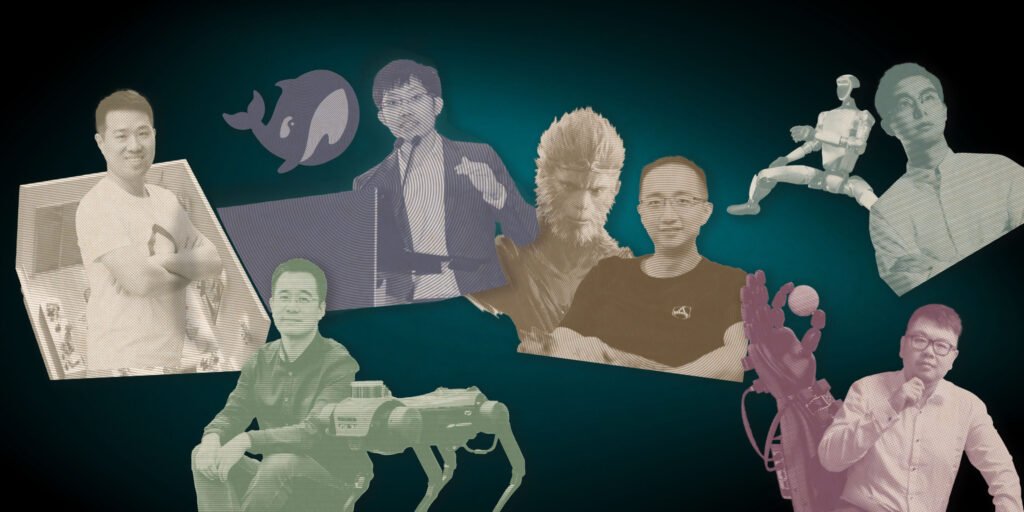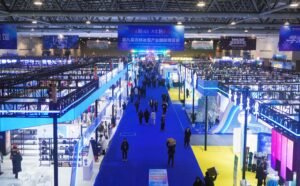By Liu Yuanju | Sixth Tone | March 6, 2025 | Shanghai
China’s tech landscape is experiencing a shift, with a new set of emerging champions challenging industry giants like Alibaba and Tencent. Dubbed the “Six Little Dragons,” these Hangzhou-based companies have revitalized China’s tech sector and prompted governments across the country to foster their own industry leaders.
The six companies leading this transformation are DeepSeek, Game Science (developer of Black Myth: Wukong), robotics firms Unitree and DeepRobotics, Neuralink rival BrainCo, and spatial intelligence firm ManyCore. While they may not yet match the scale of their more established predecessors, their impact has been profound in recent months.
The Rising Dragons
The most prominent of these firms is DeepSeek, which launched its large language model, DeepSeek-R1, on January 20. Known for its cost efficiency and high performance, the model has already garnered global attention. Within a week of its release, major cloud providers including Microsoft, Nvidia, Alibaba, Huawei, Tencent, and Baidu integrated DeepSeek-R1 into their platforms, offering seamless deployment and competitive pricing to attract users.
Another standout is Game Science, the studio behind Black Myth: Wukong. The company’s story echoes the Silicon Valley legend of the “traitorous eight.” When Tencent restructured its gaming division in 2014, seven employees, including CEO Feng Ji, left to establish their own company. A decade later, they created China’s first true AAA video game, a Steam blockbuster that has sold over 25 million copies.
The other four dragons are less internationally known but equally influential. Unitree, founded in 2016 by 26-year-old engineer Wang Xingxing, gained national attention when its dancing robots performed at this year’s Spring Festival Gala. One year later, DeepRobotics entered the scene, targeting a different market by integrating AI into its robotics and securing major clients like Singapore’s Eastern Green Power utility.
BrainCo, a leader in neural interface technology, is the only one among the six founded abroad. Established in the U.S. in 2015 by Han Bicheng, a Ph.D. candidate at Harvard University’s Center for Brain Science, BrainCo expanded to Hangzhou in 2018. It is now one of the world’s most well-funded neurotech firms, with over 100,000 high-precision brain-computer devices produced.
The least known yet equally ambitious dragon is ManyCore Technology, founded in 2011. Specializing in AI-driven spatial intelligence solutions for design and visualization, it may seem niche compared to the others. However, on February 14, ManyCore became the first of the six to file for an initial public offering.
Why Hangzhou?
The industries these companies represent are significant, but their success also speaks to a broader trend: China’s strategic push for high-tech industrial clusters.
Hangzhou’s rise as a tech hub is no coincidence. Startups often emerge in economically developed, talent-rich, and densely populated regions. Situated in the Yangtze River Delta near Shanghai, Hangzhou is home to Zhejiang University, one of China’s top academic institutions. The surrounding region is known for its strong entrepreneurial culture and business-friendly environment. The city also hosts Alibaba, a tech giant that draws top talent from across the country.
Another key factor is Hangzhou’s pro-business policies. Zhejiang province, where Hangzhou is located, is famous for its “non-interference when unnecessary, fast response when needed” approach. The city has also established numerous funding initiatives to attract and support tech firms. For instance, Yichuang Town, where Game Science is headquartered, offers full rent subsidies or exemptions for promising digital content companies, including game developers. This support helped Feng Ji and his team survive their early years.
The National Response
While government subsidies are common across China, the rapid ascent of Hangzhou’s Six Little Dragons has sparked a broader national discussion about fostering local tech ecosystems.
For example, Xinhua Daily, a state-backed newspaper in Jiangsu province, recently questioned why DeepSeek and its counterparts emerged in Zhejiang rather than its own province. Similarly, media outlets in Jinan, the capital of Shandong province, published articles analyzing what their city could learn from Hangzhou’s success.
Even high-ranking officials are taking notice. On February 5, the Secretary of the CPC Guangdong Provincial Committee highlighted three technology firms in his New Year’s speech: Huawei, DeepSeek, and Unitree.
More provinces are expected to follow suit. In China, inter-provincial competition is not just encouraged—it is institutionalized. Local officials are evaluated and promoted based on GDP growth, making economic expansion a top priority. If this heightened awareness leads to substantial policy changes, China could witness the birth of a new wave of economic growth engines.
Liu Yuanju is a research fellow at the Shanghai Institute of Finance and Law.
Editor: Wu Haiyun
Header Image: Visuals from VCG, reedited by Sixth Tone
Source: WeChat Article
Abroad Africa AI Beijing Belt & Road BLCU BRICS China chinese CPC CSC Culture Economy education EU Guizhou Kültür Langauge movie Multipolarity Russia scholarship science Shanghai Sino Sino Turkish Sino Turkish Sino Turkish Sino Turkish Sino Turkish Studies Sino Turkish Studies Sino Turkish Studies Sino Turkish Studies space Syria Taiwan Tariff trump Turkiye Türkiye University USA Xinjiang ZJUT Çin





